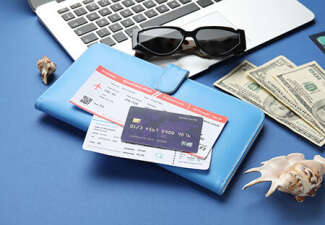The content on this page is accurate as of the posting date; however, some of the offers mentioned may have expired.
Because of the world we live in, it feels like someone is always trying to tap desperately into your credit card accounts. So some people are understandably anxious when it comes to their cards. Sometimes, though, it can be a bit much.
And some would argue that “you can never to be too safe!” How does the adage go: it’s better to be safe than sorry? Yes, there’s an element of truth tucked in there. But as preached by some Eastern religions, moderation is the key to happiness.
Lately, credit card skimming has become a hot topic that is burning up a lot of people’s properly concerned minds. People have reported this happening at popular restaurant chains like Wal-Mart and recently three men in Seattle were apprehended regarding a nationwide skimming plot.
But, Arnold Taubman, an economist employed by Credit-Land.com, has come to assuage these apprehensions about skimming.
“People should worry, but not go insane with worry,” he advised. “A waiter likely is not going to skim your card when you are paying for your dinner. Restaurants know, anyway, if they practice any unsafe tactics, their repeat customers will not be coming back. Therefore, it’s in their own best interest to nip any unsavory doings in the bud, as otherwise they can hurt their own business. “
“If it really is a big fear for you,” he went on to say. “Use cash whenever possible, as skimming’s not a threat there. If you do need to charge something, carefully scan your receipts after the fact. Then review your statements. This way, if any activity looks unorthodox to you, you can act on it fast and report it.”
He also indicated that more and more restaurants (for example) are introducing POS handheld machines, so customers can easily pay in a safer fashion.
Another world of worry for the frazzled consumer can be the internet and your credit card. The internet is full of dangers at nearly every corner, if one isn’t careful enough. You probably can’t risk being too secure online with your credit card; if that information were to drop into the wrong person’s lap, you are basically doomed.
That as it is, make sure you do some amount of shopping online, don’t forgo it totally out of fear. Instead, when you make a transaction via the web, look for an “s” in the “http” URL. That will indicate security and that you rather good to go.
If you feel that you have been reckless with your credit card, it is wise then to seek out some degree of help, from a professional such as a credit counselor. They should be able to alleviate whatever stresses you have about credit card security and educate you on what is, and is not, appropriate.
And although it might come off as smart at the time (but will be detrimental in the long term), constantly checking your credit is not a good path to take. Why? Because all those inquiries stack up and then they add up against your account and also:
“It’s really a waste of time,” said Taubman. “Your credit score will not change overnight. Even in a few weeks.”
“What I can tell people is this,” he said. “Credit cards are just like anything else; they should be used with caution but don’t go overboard with that caution.”






